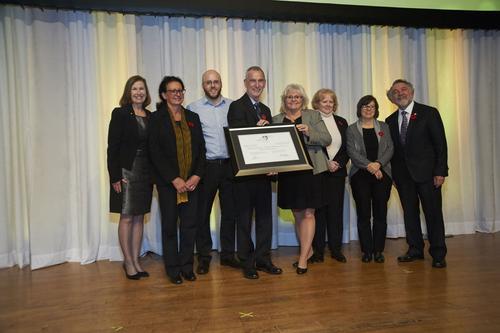The Provost’s Office was recognized at the Excellence Canada Summit last week for achieving Silver certification in Excellence Canada's Excellence, Innovation and Wellness (EIW) program.

Former Provost, Dr. Ian Orchard, and Provost's Office staff accept their Silver award at the Excellence Canada Summit. Photo: Gary Roork
The Office of the Provost is one of five offices in the University to integrate the EIW Standard at the Silver level and achieve the Silver Award for Excellence. Over the past few years, the Office has implemented significant changes and improvements to its structure and work processes as part of its strategic plan, which well-positioned the Office to apply directly for Silver certification. Key initiatives supporting and stemming from the Office’s Excellence Canada journey included applying Lean methodologies to streamline the approval process for staff hiring, developing mission, vision, and wellness statements for the Office, and creating an employee handbook to document the Office’s numerous processes.
As a busy and process-driven Office that is often the “last stop” for approvals within the University, the Excellence Canada journey provided the team with the opportunity to review and reflect on their work, identify the Office’s strengths and opportunities, and take action to implement positive changes. Every employee was equally involved and invested in the process that enabled the Office’s Silver certification in fall 2016.
About the Provost's Office
The Vice-President Academic & Provost is the chief academic and budget officer of the University of Waterloo. Working closely with the President, he leads and supports the efforts of the deans, faculty and staff to drive academic excellence across the university. The Provost also carries operational and budgetary authority and responsibility for the day-to-day operation of the university. Among other areas of accountability, guided by the University of Waterloo’s unique culture, history and mission, and the President’s strategic goals, the office needs to:
- provide leadership that supports all aspects of the university, including matters academic, financial and material
- in conjunction with Senate, the President and the senior management team, set the academic goals for the university
- work with the university community to develop, interpret, communicate and implement long-range academic plans
- set academic priorities and ensure that resources are aligned with those priorities
- act to promote innovation; collaboration; excellence in research, scholarship and teaching; and a culture of transparency
- lead development and oversee implementation of the university operating budget
- support Waterloo’s distinctive commitment to knowledge exchange with the local and global communities
- foster Waterloo’s tradition of and commitment to collegial governance
- encourage continued development and provision of high quality programs and services to students to provide them with the richest and most rewarding learning experience possible
- support faculty deans in recruiting, retaining, developing and advancing outstanding faculty
- support the federated universities and affiliated university colleges in their continuing development and delivery of high quality programs
- support the President in advancing external relationships
- serve as deputy to the President in his absence
During Silver EIW efforts, the Office of the Provost consisted of the Provost, Dr. Ian Orchard, and five full-time employees Kim Gingerich, Susan Oestreich, Beverly Seibel, Lucas Mason and Laureen Gehl. The primary objectives of the Office of the Provost are to provide the President with the support required to govern effectively and achieve annual objectives, to facilitate the implementation of the Strategic Plan, and to maintain continuity within the Office during leadership transitions.




